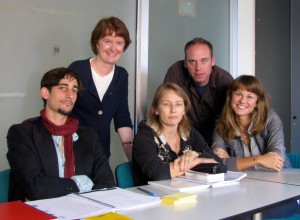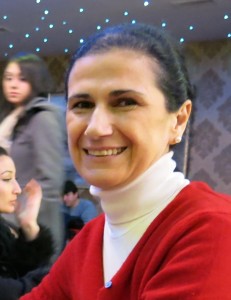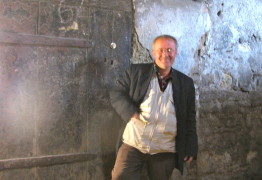As if on cue, when September arrived, the humidity dropped. The days remained sunny, but the sky turned a deeper blue. Cool breezes ruffled the Bosphorus. I turned our living room air conditioner off, stowed the controls in a closet, and kept the doors to our balcony open all day long.
Now my walks down through the forested path to the sea were a treat. On the shore of the Bosphorus, I jogged between water and rows of pastel-colored Ottoman houses. Then, breathing the scent of pines, I climbed back up to our apartment.
It wasn’t just the drier air that felt invigorating. So did the thought of new fall activities. First priority: enrolling in a Turkish class.
Speaking Turkish would be my entry to the culture; it would help me start to develop my own pathway here. The Turkish language, neither Indo-European nor Semitic, is related faintly to both Finnish and Hungarian, and is spoken by many people to the east, in Azerbaijan and many of the “stan” countries. I already knew it was difficult: it has few English cognates, and requires to speaker to place verbs at the ends of sentences. On the plus side, Turkish is pronounced exactly the way it is written, and its rules have few exceptions.
As soon as language schools reopened for the school year, Umit and I set out to investigate. I had seen advertisements for schools named Tomer and Dilmer, and we headed to their somewhat shabby offices, one on Barbaros Street in Beşiktaş, and the other near Taksim Square.
I had cherished language classes in both of “my” previous countries. In Yemen, my employer, Catholic Relief Services, had granted me two months off work so that I could participate in Peace Corps language classes. The training had been scheduled for late fall, 1979, but after American hostages were seized in Iran, the American government had held its Middle-East-bound volunteers back.
“Yemen 13,” the country’s thirteenth group of American volunteers, didn’t end up arriving until January, after I was nearly six months into my job. I’d already completed an introductory Arabic course, taught by a Swiss priest, but relished the chance to review words and structures. Often, language classes move too fast and end up building on unsteady foundations. The repetition helped fix Arabic in my mind.
I had loved studying Arabic. In fact, some of my best days in Yemen had been spent reclining in the cushioned top floor mufraj of our mud-brick training building, listening to our teachers spool out Arabic lessons. And the results were rewarding: when I could finally comprehend what people were saying and begin to converse, my stress declined dramatically. And Arabs forever ceased to appear threatening.
Alas, I didn’t recognize what was clearly in front of me: I was far more interested in language than in my health education job. It was a sign that should have put me on a path toward working with words. Doing so would have eased a great deal of angst in the upcoming years. But the sign went unnoticed.
I arrived in Costa Rica a decade and a half later with adequate Spanish, but augmented it with much-anticipated weekly conversations and forays into Latin American literature with a wonderful tutor. And finally, after returning from that country at age 41, I realized that my professional work needed to focus on words.
I was so glad to have had experiences conversing in foreign tongues. Although nearly all of my friends had studied German, French, or Spanish in high school, most had never had a chance to use what they’d learned. That was a pity. Being able to understand another person’s words—even if one is not able to replicate that level of speech—was, I thought, a kind of magical phenomenon. It was like breaking through dense clouds into bright light, a seemingly dramatic emergence that actually required months of plodding study which, like the pain of childbirth, was forgotten once the breakthrough occurs. Rarely in my life had there been such a straight path between mundane effort and exhilarating reward. To me, this sense of exhilaration was even better than sex, and there was no question I was going to pursue fluency here in Turkey.
It was typical of the newcomer fog I went around in here that I hadn’t given much thought to what might happen when I visited a language school. At both Tomer and Dilmer, I was immediately guided to a small, empty classroom and handed a written test to complete: ten or so pages of multiple choice questions photocopied so many times that the lettering appeared blurry.
I had never taken a written Turkish exam before; heretofore my “tests” had simply come in the form of verbal communication. And I wasn’t particularly interested in reading and writing Turkish, only in being able to speak and understand it. Perhaps, I thought, there would be another phase of the test, one in which someone would converse with me.

Impatient, I turned in my papers before trying to complete all the questions. But apparently that was the end of the assessment. At Tomer, a stern-looking middle-aged man glanced at my test paper, but not at me, and told me I would be placed with students who had absolutely no knowledge of Turkish. At Dilmer, the situation was similar.
My Turkish was better than that of a rank beginner! I had taken an online course for three months, had amassed several hundred flashcards, and had a firm grasp of the present tense. True, that hadn’t made me very conversant, but at least I was able to communicate my needs to shopkeepers. Miffed by the impersonal treatment I’d received (and now with considerably more pride than my younger, more flexible Yemen self), I didn’t stop to consider that perhaps my Turkish underlayment was also weak, and thus taking a repeat course might be a good idea.
Back home, I expressed my frustration to Sankar. He listened and then, to my surprise, took my complaints to his secretary, Didem, whose job description included helping me get settled in Turkey. The next day, Didem called and offered to accompany me to the final school on my list. Its full name was unclear, but it went by the acronym EFINST.
EFINST was just off the main road that ran through the upscale suburb of Etiler, not far from our apartment. Inside its offices Didem and I sat down with the director, a heavily made-up woman of about forty named Ciğdem (CHEE dem) and, formalities first, sipped tulip glasses of tea. The two chatted in Turkish, referring to the organization as “EF,” and I noticed that Didem was poised and self-assured beyond her clerical job title.
After a few minutes, I went off to a classroom and took yet another written test. It was not much different from the others, but this time I was expecting it and applied myself more diligently, making educated guesses when possible. The result? I wasn’t told my numerical score, but Ciğdem told me I could join an intermediate class if I was willing to take two weeks of private lessons to bring me up to that level.
Ten full days of tutoring paid for by the company? What could be better? I thanked Didem for her role in securing this.
I had approached EFINST different from the first two schools, and in a manner I was unaccustomed to, bringing in reinforcements and throwing the weight of the company around. That went against my usual modus operandi—I disliked the feeling of getting something I didn’t deserve. But having recently capitulated to having a driver, I decided there was no use complaining about this new prerogative. I brushed any negative thoughts away: the school was probably pleased to have a new student and I was determined to work my very hardest.
I have always been the language person in our marriage. In our first years together, Sankar and I made several visits to Spain, and, not knowing a word of the language, he took my lead. In the mid-1990s we moved to Costa Rica, and he started Spanish lessons. He did well, thanks in part to his willingness to speak even when he didn’t quite know the right words. But I’d had a head start, and throughout our time there had enjoyed being the family translator.
With Turkish, Sankar and I had both started out at zero, but from the beginning I’d had more time to study the language. And Sankar’s job here involved traveling outside of Turkey a great deal, making any kind of mastery both more difficult and less useful.
I’ve always been a competitive person, and I enjoyed having this advantage. But my language skills didn’t always prevail. Perhaps because Sankar was raised in multi-lingual, multi-cultural India (and had spent his childhood moving from state to state in India, each time learning a new language and writing system), he used a kind of full-context approach, taking in body language, eyebrows, gestures, and tones of voice in addition to words, to suss out meaning.
From the opposite kind of background, in which everyone I knew had been essentially the same (this, I was beginning to realize, was a real handicap, and not just in the realm of language), I tended to focus solely on words themselves. When stumped, I’d find myself reaching for my pocket dictionary while Sankar focused on capturing an approximation of meaning and then acting on it. In those cases I ended up feeling both chastened (it galled me that imprecision, approximation, could save the day) and envious.
Umit dropped me off at EF for my first day of lessons. On a large, shaded terrace in front of the building, I sat down with Ferda, EF’s director of language studies and my Turkish tutor for the next two weeks.
Ferda didn’t look the way I expected. To my inexperienced eye, Turkish women fell into just two categories: stylishly Italian (slim physique, shoulder-length brown hair, careful makeup, stylish clothing) and Russian peasant (filmy headscarf with a point halfway down the back; baggy, often floor-length coat; little or no makeup). But Ferda didn’t fit either of these. Tall and forty-something, she had black hair that she wore twisted into a braid, and little makeup. She was wearing a woven peasant top and a wrap skirt that almost looked Guatemalan. She would definitely fit into my more nuanced American categories: crunchy, earth mother.
Ferda greeted me in Turkish and always spoke it thereafter (I didn’t know if she spoke any English.) Her voice was light and almost singsong-y, a pitch that could have been annoying, but wasn’t. I found her words unusually easy to understand—and have never figured out quite why that was so. Even more amazing, she understood all of the broken Turkish that came from my mouth. She talked, I listened and understood. I tried to talk, and she affirmed. Our two weeks flew past. I wished I could continue private study with Ferda, but knew that wouldn’t be practical.
On the first day of intermediate class, I arrived early and was directed upstairs, where I waited outside a locked classroom. A portrait of Atatürk hung on the wall and I stood in front of it, gazing at this fierce, handsome Turkish demi-god. His pale blue eyes were the key, I decided: both arresting and exotic. I tried to read the lengthy quotation under the picture, but quickly gave up.
Soon another student arrived, a compact, athletic-looking blonde. She introduced herself in British-accented English as Annika, from Sweden, and we began to chat. She told me she’d been living in Turkey for a year, having moved here with her husband, who managed a subsidiary of a German machine tool company. Their 11-year-old son was with them, and they had four grown children back in Sweden.
A staff person came and unlocked the classroom door for us, and other students drifted in. Two Germans, one named Karl, who said he was spending his two week vacation here studying Turkish, and the other, Adrian, a Gallic–looking young Berliner. And finally Anete, a striking, chestnut-haired young woman from the Czech Republic.
Ten minutes late, the teacher, a thirty-something woman with dark, curly hair, named Gülcan (GOOL jahn; Gül = rose and Can = dear) sauntered in in no particular hurry. She seemed to know both women from previous classes and greeted them. Then we went around and introduced ourselves. When it was Monica’s turn, to my surprise, Gülcan broke in with, “This is Annika. She is very karamsar.” Gülcan explained in Turkish that karamsar meant positif değil (degil negates the word in front of it), not positive. Annika looked surprised, and her face reddened, but she gave a shrug of admittance.
Then we got started. First, Gülcan spoke to us in Turkish—about the weather, about what she’d done the past weekend, about the previous night’s television programs. This was difficult and, as she was going too fast for me to use my dictionary, I found myself leaning forward and staring intently at her, desperate to try and pick up any and all cues. After that we got to work on a Turkish verb tense. A printed reading followed. The class would continue in this pattern.
At noon (the class met from 9 am until 2 pm three days each week), we students walked several blocks to a tiny Turkish restaurant run by a family from Anatolia. This was my first exposure to Turkish neighborhood food and it was positif. The place offered a buffet of rice and barley dishes, meat and vegetable stews, bread, and usually a sütlü tatlı, milky dessert (Turks are hopelessly addicted to pudding). It made me smile to think of the provincial staff having, simply by dint of their café’s location, to accustom themselves to tongue-tied students stumbling in, pointing dumbly at foods they wanted to eat, and then fumbling to count out Turkish lira.
After lunch, if the weather was sunny, the five of us would walk to a tiny park nearby and sit and chat (in English) about life in our countries.
It was quickly clear that I was the weakest student in the class. First, I had to tune out the others in a kind of trance just to understand what Gülcan was saying. Self-consciousness forgotten, I raised my hand for help whenever I was stumped, which was often. But then, when asked to come out with spoken Turkish, I became tongue-tied.
I remember a conversation about “what we did over the weekend,” in which I wanted to tell Gülcan about a delicious orange-colored tabbouli-like salad I’d encountered. I thought the salad was called kisir, which would have been pronounced keeSEER, but it was actually kısır, using the undotted Turkish i, which pronounced “uh.” As I struggled to say kuhSUHR, Gülcan looked at me, first with puzzlement and then with annoyed exasperation. The class fell silent, embarrassed. Finally, she rolled her eyes and gave up, turning back to the board.
Speaking out in a foreign language opens a person to ridicule, and I hated being in this position. These excruciating moments would occur again and again in class—and would come back to me every time I ran into the now-hateful salad.
I had always been an eager, sit-in-the-front-of-the-class kind of student. Smiling, keeping my homework up to date, always turning in assignments on time. But here my effort and interest seemed to draw the teacher’s ire. I began to feel anxious about asking Gülcan questions, and was even less able to produce Turkish. One day she even singled me out, much as she had done to Annika on the first day, with, “Susan, siz duygusal, bence,” Susan, I think you are emotional.
One morning in pouring rain—the dry, fall weather had given way to frequent thunderstorms—Umit dropped me off at EF and then headed back to Asia to take Sankar on a customer visit. I went upstairs and waited by our classroom as usual, but nobody turned up. After ten, then fifteen minutes, I went down to the administrative offices and asked what was going on. The secretary informed me that Gülcan had cancelled class that day. I hadn’t been informed; clearly, the others had.
If it had been nice day, I would have simply left, making the half hour walk back home, but with rain coming down, I didn’t quite know what to do.
“I don’t have a ride home, and I wasn’t told about the cancellation,” I informed the secretary. I was angry, and becoming more so as I thought about what had happened. But I was also aware of being a guest here—and acculturated enough to be embarrassed at having fallen out of favor with my teacher.
One of EF’s drivers (all organizations had them) finally took me home that day. I called Annika and learned that Gülcan had emailed her, and presumably all the other students, about the cancellation. The next day Gülcan told me she hadn’t had any contact information for me.
If this incident had taken place back in the States, I would have headed back to the administrative office, insisted on seeing my files and contact info, and then taken that information to Gülcan to show her. But I didn’t do that. I didn’t want her to treat me even worse.
Gülcan was one of only two hostile Turks I would meet in my years in Turkey, and I spent time trying to figure out the reasons for her behavior. The first thing that came to my mind was that perhaps she disliked Americans. Surely our war in Iraq had given her and her countrymen reason. During our several days of language and culture training back in St. Paul, a Turkish trainer had confided that she had been furious with the U.S. back in 2003 and afterward because our war had nearly destroyed Turkish tourism. But the woman had gone on to say that most Turks had gotten over those sentiments.
I was Gülcan’s oldest student, the weakest in Turkish, and probably the most intense. My face took on a confused expression whenever I didn’t understand something, and then my hand would shoot up. Maybe my eagerness irritated her. Maybe my constant curiosity seemed like a challenge to her teaching. Or perhaps she simply realized that she was the gatekeeper for my ambitions, and decided to lord that power over me.
I disliked going to class each day. But I didn’t think seriously of quitting. Staying home would be worse than putting up with Gülcan: it would put a roadblock in my way here. At least I was meeting people and making a few friends. I appreciated having something to do three days a week—and having homework to do in the evenings. Besides, after failing to pursue my interest in language for so many years, how could I step off the path now?
I remember sitting in class frustrated almost to the point of tears, but I don’t recall many conversations about the situation with Sankar. I recently asked Sankar about this, and he said he doesn’t remember me being overly upset. Apparently I hadn’t made a big issue of it at home, hadn’t asked him for advice on whether I should continue. This strikes me as an inadvertently healthy move: I was making my own way, not tying this problem to his bringing me to Turkey. I had insisted on a higher-level class, he had helped me get it, and now it was my own business.
At this point, it simply became a matter of waiting the class out. It was only eight weeks long; perhaps we would get a different teacher for the next session.
The class did have one non-language positive: my interesting classmates. Karl, from Neuss—oddly, the only place in Germany I had ever visited—was quiet, but he apparently worked as a salesman. I suspected interest in a Turkish girl was his impetus for studying the language, but I never found out.

Anete, 27, was from a village of less than 200 people in The Czech Republic. She had been discovered as a model at the opera house in Prague, and had come to Turkey on location. Here, she had fallen in love with and married a Turk.
Adrian worked as a German teacher back in Berlin. Most days he arrived in class carrying a bright yellow duck umbrella (the weather was becoming more and more rainy), and he told us he taught German simply by walking his students around his city. Ever since, I’ve always pictured Adrian leading a group of student-ducklings along Berlin sidewalks with his umbrella unfurled, rain or shine. Adrian had forgotten to bring his passport to Turkey, but had managed to talk the normally ultra-serious Turkish authorities into letting him in—an amazing feat. He had a genuine interest in learning Turkish because, as he said, “I want to get to know the Turks in my city.” That sentiment would have melted the immigration officials.
And then there was Annika. I had experienced First Overseas Friendships before, and knew they didn’t always last, but Annnika and I were getting along well. To be sure, she was negative; I would always associate the word maalesef, (MA luh sef), meaning, “unfortunately,” with her. She used it all the time. Maalesef, she didn’t see her other children enough. Maalesef, Turkey was not at all like Sweden. Maalesef, there wasn’t much to do here.
Hearing Annika criticize Turkey made me want to defend it. I pointed out interesting places Sankar and I had visited, urging her to appreciate the bountiful treasures in Istanbul and outside the city. I offered to lend her a guidebook, and asked her if she was interested in coming with me to the upcoming International Women of Istanbul meeting, but she shook her head. These kinds of conversations ended up buoying my own mood, if not hers, reminding me of the positives here in Turkey.
I understood how Annika was feeling and behaving because I had felt and acted the same way in Costa Rica. Being with Annika was like revisiting my past, like taking a look at Expatriate Wife 1.0. while I was busy working to build version 2.0.
Annika did have some habits I admired. She told me that every morning, she went to her apartment complex’s gym and ran several miles on the treadmill, all the while composing Turkish sentences in her head. Simultaneous exercising and language learning: what a boost to the entire body!
And so I continued, attending a class I often dreaded. I was gaining the kind of perspective adversity often provides: I had never bothered to consider the “bad” students who had been my classmates in my school days—the ones that sat in the back or off to the side, fooling around unhappily and silent when called upon, but now I had ample insights into how they must have felt.
Was my Turkish improving? Probably. My flash card pile was growing, and every day I felt just a little more confident.
Stone by stone, step by step. Building a path that would lead me out of isolation. And before long I got some good news. Our next eight-week class would be taught by Ferda!






